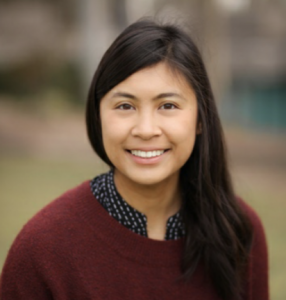Name: Michelle Franc Ragsac
Hometown: San Mateo, CA
Lab: Farley Laboratory
Lab website: https://farleylab.com/
Hobbies: Eating new foods; Playing video games and board games with friends; Hanging out with my dog; Making artsy things
What do you study?
In my lab, I use bioinformatics tools and computational methods to study embryonic development in the model organism Ciona intestinalis, otherwise known as the sea squirt. During development, a zygote is formed when a male gamete (sperm) and female gamete (egg) come together. I am interested in how single-celled zygotes develop into a multicellular organism, and how the processes to regulate this transition are encoded in an organism’s DNA. To do this, I have been studying enhancers–non-coding DNA regulatory elements that determine where and when genes are expressed–using various next-generation sequencing methods, biological imaging techniques, and computational approaches.
Why is it important?
When you look at the tree of life, Ciona intestinalis is a member of the sister group to vertebrates (e.g. birds, fish, amphibians, reptiles, and mammals—including humans). This evolutionary relationship can be best seen during development: Ciona embryos share many of the same developmental structures as vertebrates, such as a nerve cord, notochord, tail muscle, and heart. We can use Ciona as a model organism to study embryogenesis and understand the basics of organ development and how conserved developmental processes are, or how genetic abnormalities can lead to developmental defects.
What piqued your interest in science?
When I took my first Biology class in high school, we had a lab assignment where we had to transform bacteria to make them glow with green fluorescent protein (GFP). I remember seeing the bacteria glowing after we were done with the transformation experiment and realizing that science was pretty cool.
What do you like about being a scientist?
I am the first in my family to become a scientist and do biological research, and I feel like science has opened a lot of doors for me to meet new people, travel, and learn new things! As a scientist, I love learning more about how the world around us works and be able to talk to people about new discoveries across different fields and in different places.
What are 5 general vocabulary terms someone should know going into your field of science?
bioinformatics, genomics, gene, embryo, model organism
What are 5 specific vocabulary terms someone should know about your research?
next-generation sequencing (NGS), single-cell technologies, transcription factors (TFs), enhancers, gene regulatory networks

